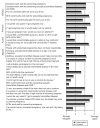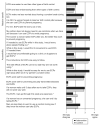Attitude and behavior effects in a randomized trial of increased access to emergency contraception
- PMID: 19104366
- PMCID: PMC2733785
- DOI: 10.1097/AOG.0b013e318190c0fe
Attitude and behavior effects in a randomized trial of increased access to emergency contraception
Abstract
Objective: To explore the effects of providing unrestricted access to emergency contraception in advance of need on various psychosocial outcomes and pregnancy.
Methods: In the trial, women were randomly assigned to either increased access to emergency contraception (two free packs at enrollment with unlimited free resupply) or standard access. Participants were evaluated for 1 year for pregnancy and other outcomes. Psychosocial data were collected at enrollment and at 6 and 12 months. We applied exploratory factor analysis for data reduction. We compared the resulting psychosocial factors (including factors related to "aversion to pregnancy" and to the perceived "relative benefit" and "accessibility" of emergency contraception), two items directly assessing substitution, and pregnancy between randomization groups over time.
Results: On average, women in the increased access group had significantly stronger perceptions of both the "relative benefit" and "accessibility" of emergency contraception (P<.001 for each). Women in the increased access group were significantly more likely to report that they had ever used emergency contraception because they did not want to use either condoms or another contraceptive method (P<.001). Regarding pregnancy, we noted a significant interaction between randomization group and "aversion to pregnancy" (P=.010): among the least "averse" women, increased access had a protective effect (hazard ratio 0.64, 95% confidence interval 0.39-1.04); among the most "averse" women, increased access had a deleterious effect (hazard ratio 1.73, 95% confidence interval 1.01-2.98).
Conclusion: As a result of having unrestricted access, some women substituted emergency contraception for their usual contraceptive methods.
Clinical trial registration: ClinicalTrials.gov, www.clinicaltrials.gov, NCT00060463
Level of evidence: I.
Figures


References
-
- Raymond EG, Trussell J, Polis CB. Population effect of increased access to emergency contraceptive pills: a systematic review. Obstet Gynecol. 2007;109:181–8. - PubMed
-
- Polis CB, Schaffer K, Blanchard K, Glasier A, Harper CC, Grimes DA. Advance provision of emergency contraception for pregnancy prevention: a meta-analysis. Obstet Gynecol. 2007;110:1379–88. - PubMed
-
- Gold MA, Wolford JE, Smith KA, Parker AM. The effects of advance provision of emergency contraception on adolescent women’s sexual and contraceptive behaviors. J Pediatr Adolesc Gynecol. 2004;17:87–96. - PubMed
-
- Raine TR, Harper CC, Rocca CH, et al. Direct access to emergency contraception through pharmacies and effect on unintended pregnancy and STIs: a randomized controlled trial. JAMA. 2005;293:54–62. - PubMed
-
- Raymond EG, Stewart F, Weaver M, Monteith C, Van Der Pol B. Impact of increased access to emergency contraceptive pills: a randomized controlled trial. Obstet Gynecol. 2006;108:1098–1106. - PubMed
Publication types
MeSH terms
Substances
Associated data
Grants and funding
LinkOut - more resources
Full Text Sources
Medical
Research Materials

